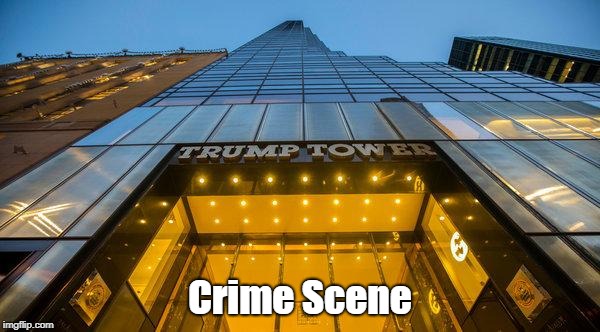A Clear Link Between Trump and Russia Is Now Out in the Open
A new Mueller court filing describes how Michael Cohen negotiated with the Kremlin about a Moscow business deal during the 2016 campaign.
The key revelation of Michael Cohen’s new guilty plea is this: Justice Department Special Counsel Robert Mueller is one step closer to showing links between Donald Trump’s business interests in Russia and his conduct as a candidate for president.
The criminal information filed by Mueller’s prosecutors in the Southern District of New York states that in a period that lasted until the middle of June 2016, Cohen asked the press secretary to Russian President Vladimir Putin for a meeting with Putin in Russia as part of a deal that would have led to a Trump Tower being built in Moscow.
And according to the document, Cohen spoke to Trump about the deal more than three times during that period, and asked both Trump and other senior campaign officials about a Trump trip to Russia in connection with the deal.
Cohen is pleading guilty to lying to Congress by saying these negotiations had ended by January 2016 and by denying that he spoke to Trump about them.
The details that emerge in the document are fascinating and rich.
But the main takeaway is that Cohen and others in the Trump organization were actively doing a Russia deal that linked Trump’s emerging presidential candidacy with his business interest in a Moscow Trump Tower. And Trump knew about it, to a degree yet to be revealed.
Until now, many have speculated that there must be some link between Trump’s business interests in Russia and his campaign conduct. The Cohen plea provides more concrete evidence of such a link.
Now for the specifics.
The story told by the criminal information runs like this:
Starting in September 2015, the Trump Organization was pursuing a deal to build a Trump Tower in Moscow. Cohen was working on making the deal happen.
In mid-January of 2016, someone described as “a U.S. citizen third-party intermediary” and identified only as “Individual 2” suggested to Cohen that he contact Putin’s press secretary for “approvals” from the Russian government.
Cohen emailed Putin’s press secretary twice, on Jan. 14 and Jan. 16, 2016.
On Jan. 20, Cohen got a call from the press secretary’s assistant. They spoke for 20 minutes, and Cohen described the deal.
The next day, Jan. 21, Individual 2 wrote to Cohen that he should call them about Putin, because “they called today.”
That began a period of negotiations lasting six months. Apparently, the Russians’ goal was to get Trump to visit Russia and meet Putin. Cohen asked Trump and other campaign officials about Trump traveling to Russia for the meeting. Cohen would go to Russia ahead of time to negotiate the details.
In May, things heated up. Individual 2 emailed Cohen explaining the state of play. “I had a chat with Moscow,” he wrote. “ASSUMING the trip does happen the question is before or after the convention … Obviously the pre-meeting trip (you only) can happen anytime you want but the 2 big guys where [sic] the question. I said I would confirm and revert.”
This email makes clear that there was a close connection between Trump’s status as a candidate and the visit.
Cohen wrote back about “My trip before Cleveland” — where the Republican national convention would be held starting on July 18. Trump would travel to Russia “once he becomes the nominee after the convention.”
Individual 2 then told Cohen that Putin’s press secretary “would like to invite you as his guest to the St. Petersburg Forum which is Russia’s Davos it’s June 16-19. He wants to meet there with you and possibly introduce you” to Putin or the Russian prime minister, Dmitry Medvedev.
Over the next month, Individual 2 sent Cohen the paperwork for a visa, which Cohen seems to have filled out.
The trip looked like it was a go to Cohen, but it was called off around June 14, 2016, when Cohen met Individual 2 at Trump Tower to tell him it wasn’t happening. According to Cohen, the real estate deal was also off at that point.
The document doesn’t say how or why Cohen’s trip was canceled. The most logical possibility is surely that Trump’s campaign advisers told him that he couldn’t go to Moscow after becoming the Republican nominee.
So what does it all mean?
Trump and his supporters will no doubt insist that Cohen and Individual 2 were freelancing, not really representing Trump or the campaign. But the fact that Cohen kept Trump in the loop by asking him about possible travel to Russia strongly suggests that Trump knew that the negotiations over the Moscow Trump Tower were continuing during this period.
Trump supporters might add that it isn’t surprising to discover that Trump didn’t stop his business negotiations with Russia just because he was running for president. Yet it remains significant that those negotiations were happening with Putin’s office directly, not just with real estate developers in Moscow.
Trump supporters can also point out that the deal was canceled. Nevertheless, it seems likely that the deal was killed not because Trump realized it was wrong but because outside advisers told him it would look bad.
Cohen’s latest revelations on their own don’t constitute evidence of a crime or impeachable offense by Trump. However, they do show that Trump was part of a negotiation that linked his status as a candidate to his business interests in Russia. They bring Mueller’s team an important step closer to explaining Trump’s Russia ties during the campaign.
Noah Feldman is a Bloomberg Opinion columnist. He is a professor of law at Harvard University and was a clerk to U.S. Supreme Court Justice David Souter. His books include “The Three Lives of James Madison: Genius, Partisan, President.”

No comments:
Post a Comment